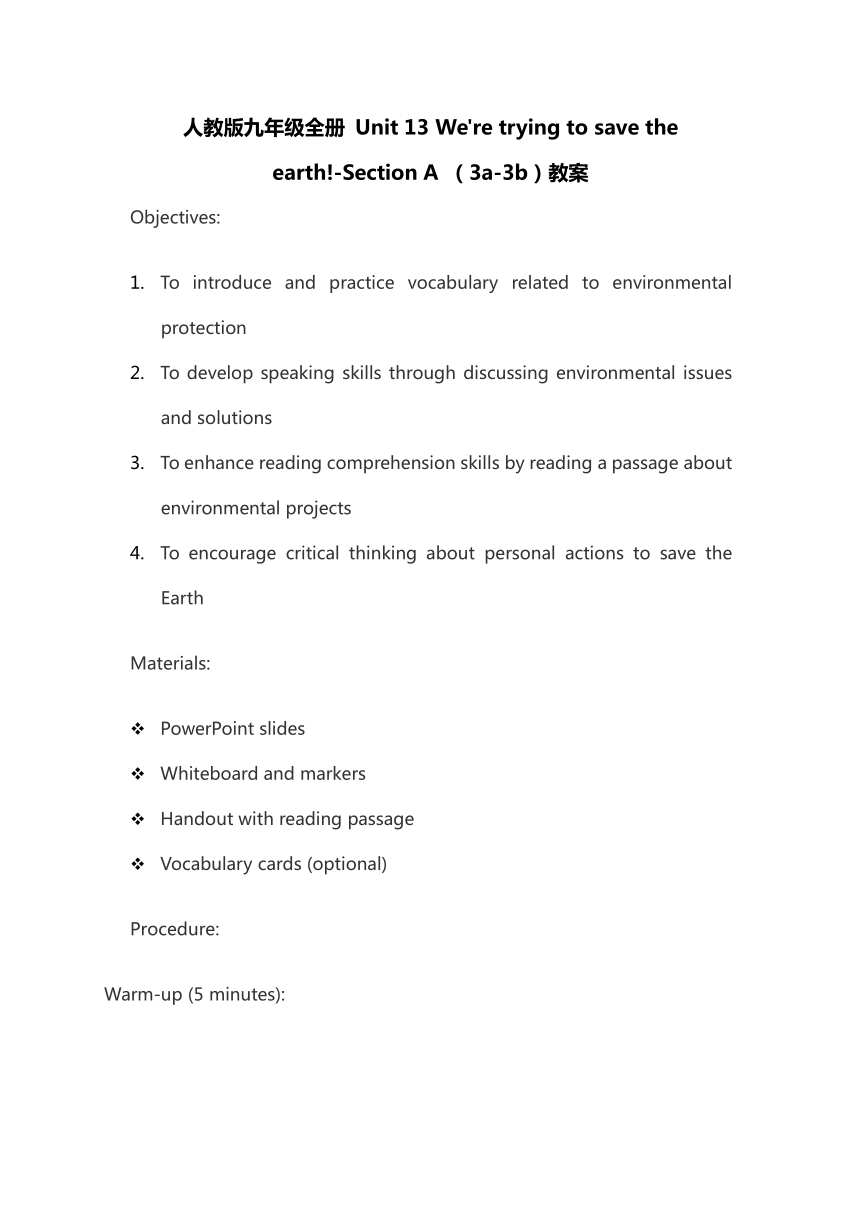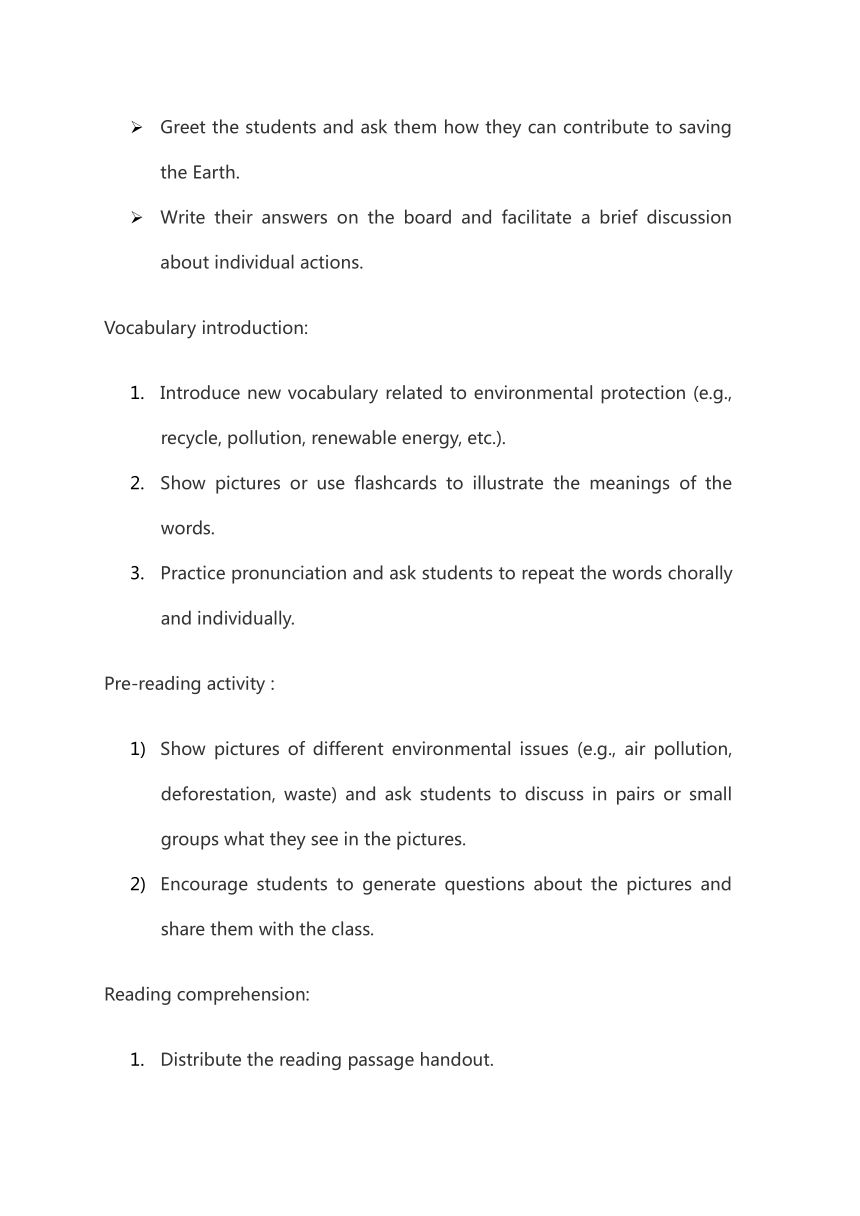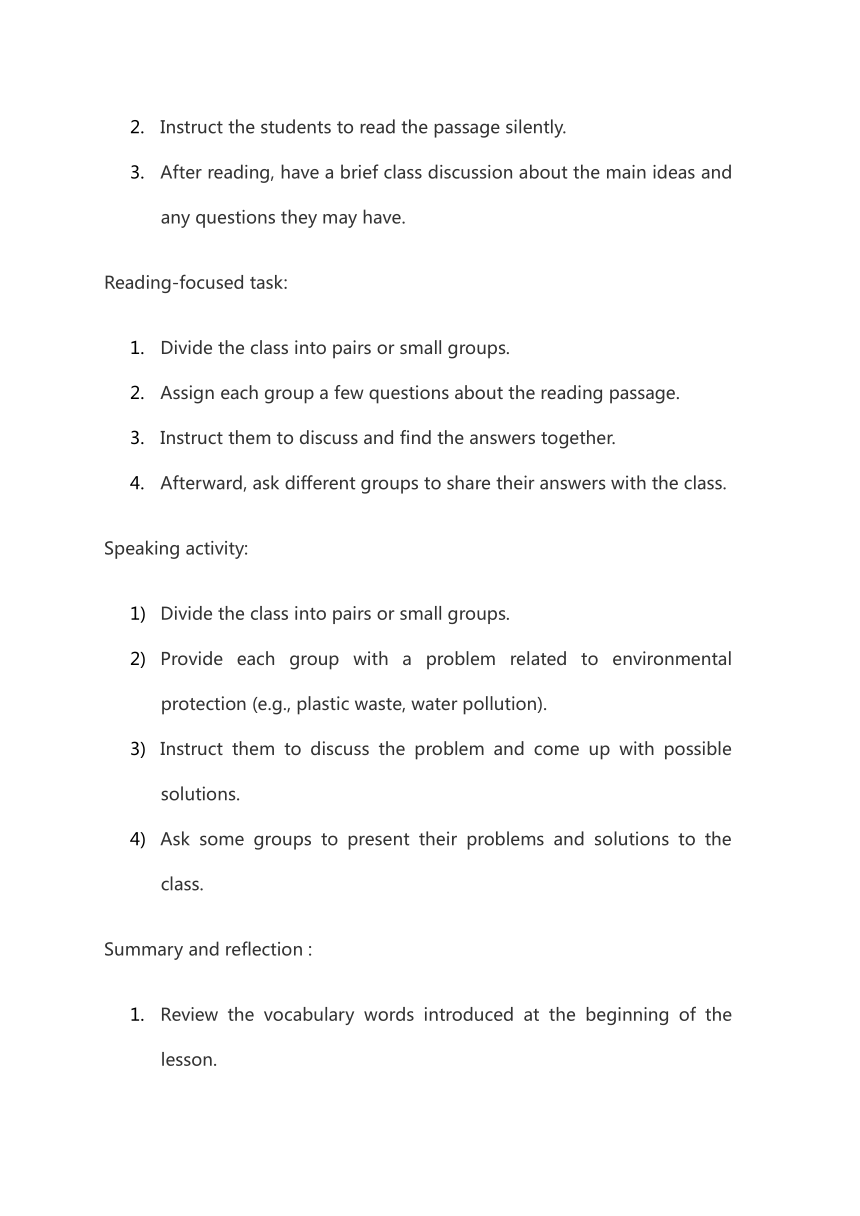Unit 13 We're trying to save the earth! Section A (3a-3b)教案 人教版英语九年级全册
文档属性
| 名称 | Unit 13 We're trying to save the earth! Section A (3a-3b)教案 人教版英语九年级全册 |  | |
| 格式 | docx | ||
| 文件大小 | 18.6KB | ||
| 资源类型 | 教案 | ||
| 版本资源 | 人教新目标(Go for it)版 | ||
| 科目 | 英语 | ||
| 更新时间 | 2023-07-20 20:21:02 | ||
图片预览



文档简介
人教版九年级全册 Unit 13 We're trying to save the earth!-Section A (3a-3b)教案
Objectives:
To introduce and practice vocabulary related to environmental protection
To develop speaking skills through discussing environmental issues and solutions
To enhance reading comprehension skills by reading a passage about environmental projects
To encourage critical thinking about personal actions to save the Earth
Materials:
PowerPoint slides
Whiteboard and markers
Handout with reading passage
Vocabulary cards (optional)
Procedure:
Warm-up (5 minutes):
Greet the students and ask them how they can contribute to saving the Earth.
Write their answers on the board and facilitate a brief discussion about individual actions.
Vocabulary introduction:
Introduce new vocabulary related to environmental protection (e.g., recycle, pollution, renewable energy, etc.).
Show pictures or use flashcards to illustrate the meanings of the words.
Practice pronunciation and ask students to repeat the words chorally and individually.
Pre-reading activity :
Show pictures of different environmental issues (e.g., air pollution, deforestation, waste) and ask students to discuss in pairs or small groups what they see in the pictures.
Encourage students to generate questions about the pictures and share them with the class.
Reading comprehension:
Distribute the reading passage handout.
Instruct the students to read the passage silently.
After reading, have a brief class discussion about the main ideas and any questions they may have.
Reading-focused task:
Divide the class into pairs or small groups.
Assign each group a few questions about the reading passage.
Instruct them to discuss and find the answers together.
Afterward, ask different groups to share their answers with the class.
Speaking activity:
Divide the class into pairs or small groups.
Provide each group with a problem related to environmental protection (e.g., plastic waste, water pollution).
Instruct them to discuss the problem and come up with possible solutions.
Ask some groups to present their problems and solutions to the class.
Summary and reflection :
Review the vocabulary words introduced at the beginning of the lesson.
Engage in a class discussion about the students’ own actions to save the Earth.
Encourage students to reflect on what they have learned and share their thoughts.
Homework (optional):
Assign students to write a short paragraph or essay about one action they can take to protect the environment.
Ask them to include reasons why this action is important and how it can make a difference.
Vocabulary practice:
Divide the class into pairs or small groups.
Give each group a set of vocabulary cards (if available) with words related to environmental protection.
Instruct the students to match the words with their definitions or provide examples of how each word can be used.
Monitor the groups and provide assistance as needed.
Cooperative learning activity:
Divide the class into groups of four.
Assign each group a different environmental project, such as “Promoting Recycling” or “Conserving Energy.”
Instruct the groups to brainstorm and create an action plan for their assigned project. They should consider the steps involved, the resources needed, and the potential impact of their project.
Encourage collaboration and creativity within the groups.
After the allotted time, ask each group to present their action plan to the class.
Reflection and discussion:
Lead a class discussion by asking students how they felt during the cooperative learning activity.
Encourage students to share their thoughts on the importance of taking action to protect the environment and the potential challenges they may face.
Wrap up the discussion by highlighting the significance of individuals working together to make a difference.
Conclusion:
Summarize the key points discussed during the lesson.
Express your appreciation for the students’ participation and effort.
Extension activity (optional):
Assign students to research and prepare a short presentation on a specific environmental issue of their choice.
Encourage them to include information on the causes, effects, and potential solutions related to the chosen issue.
Allocate time in a future class session for students to present their findings.
Objectives:
To introduce and practice vocabulary related to environmental protection
To develop speaking skills through discussing environmental issues and solutions
To enhance reading comprehension skills by reading a passage about environmental projects
To encourage critical thinking about personal actions to save the Earth
Materials:
PowerPoint slides
Whiteboard and markers
Handout with reading passage
Vocabulary cards (optional)
Procedure:
Warm-up (5 minutes):
Greet the students and ask them how they can contribute to saving the Earth.
Write their answers on the board and facilitate a brief discussion about individual actions.
Vocabulary introduction:
Introduce new vocabulary related to environmental protection (e.g., recycle, pollution, renewable energy, etc.).
Show pictures or use flashcards to illustrate the meanings of the words.
Practice pronunciation and ask students to repeat the words chorally and individually.
Pre-reading activity :
Show pictures of different environmental issues (e.g., air pollution, deforestation, waste) and ask students to discuss in pairs or small groups what they see in the pictures.
Encourage students to generate questions about the pictures and share them with the class.
Reading comprehension:
Distribute the reading passage handout.
Instruct the students to read the passage silently.
After reading, have a brief class discussion about the main ideas and any questions they may have.
Reading-focused task:
Divide the class into pairs or small groups.
Assign each group a few questions about the reading passage.
Instruct them to discuss and find the answers together.
Afterward, ask different groups to share their answers with the class.
Speaking activity:
Divide the class into pairs or small groups.
Provide each group with a problem related to environmental protection (e.g., plastic waste, water pollution).
Instruct them to discuss the problem and come up with possible solutions.
Ask some groups to present their problems and solutions to the class.
Summary and reflection :
Review the vocabulary words introduced at the beginning of the lesson.
Engage in a class discussion about the students’ own actions to save the Earth.
Encourage students to reflect on what they have learned and share their thoughts.
Homework (optional):
Assign students to write a short paragraph or essay about one action they can take to protect the environment.
Ask them to include reasons why this action is important and how it can make a difference.
Vocabulary practice:
Divide the class into pairs or small groups.
Give each group a set of vocabulary cards (if available) with words related to environmental protection.
Instruct the students to match the words with their definitions or provide examples of how each word can be used.
Monitor the groups and provide assistance as needed.
Cooperative learning activity:
Divide the class into groups of four.
Assign each group a different environmental project, such as “Promoting Recycling” or “Conserving Energy.”
Instruct the groups to brainstorm and create an action plan for their assigned project. They should consider the steps involved, the resources needed, and the potential impact of their project.
Encourage collaboration and creativity within the groups.
After the allotted time, ask each group to present their action plan to the class.
Reflection and discussion:
Lead a class discussion by asking students how they felt during the cooperative learning activity.
Encourage students to share their thoughts on the importance of taking action to protect the environment and the potential challenges they may face.
Wrap up the discussion by highlighting the significance of individuals working together to make a difference.
Conclusion:
Summarize the key points discussed during the lesson.
Express your appreciation for the students’ participation and effort.
Extension activity (optional):
Assign students to research and prepare a short presentation on a specific environmental issue of their choice.
Encourage them to include information on the causes, effects, and potential solutions related to the chosen issue.
Allocate time in a future class session for students to present their findings.
同课章节目录
- Unit 1 How can we become good learners.
- Section A
- Section B
- Unit 2 I think that mooncakes are delicious!
- Section A
- Section B
- Unit 3 Could you please tell me where the restroom
- Section A
- Section B
- Unit 4 I used to be afraid of the dark.
- Section A
- Section B
- Unit 5 What are the shirts made of?
- Section A
- Section B
- Review of Units 1-5
- Unit 6 When was it invented?
- Section A
- Section B
- Unit 7 Teenagers should be allowed to choose their
- Section A
- Section B
- Unit 8 It must belong to Carla.
- Section A
- Section B
- Unit 9 I like music that I can dance to.
- Section A
- Section B
- Unit 10 You're supposed to shake hands.
- Section A
- Section B
- Review of Units 6-10
- Unit 11 Sad movies make me cry.
- Section A
- Section B
- Unit 12 Life is full of the unexpected
- Section A
- Section B
- Unit 13 We're trying to save the earth!
- Section A
- Section B
- Unit 14 I remember meeting all of you in Grade 7.
- Section A
- Section B
- Review of Units 11-14
